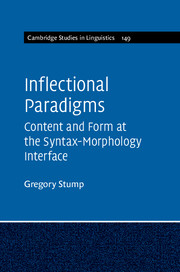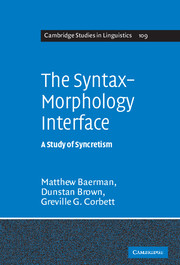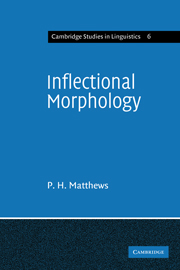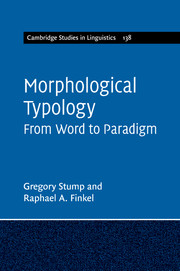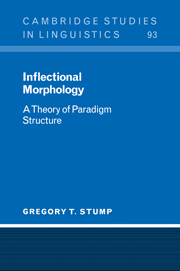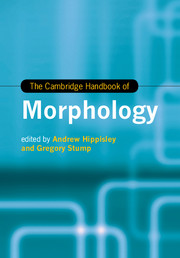Inflectional Paradigms
Content and Form at the Syntax-Morphology Interface
Part of Cambridge Studies in Linguistics
- Author: Gregory Stump, University of Kentucky
- Date Published: January 2016
- availability: Available
- format: Paperback
- isbn: 9781107460850
Paperback
Other available formats:
eBook
Looking for an inspection copy?
Please email [email protected] to enquire about an inspection copy of this book
-
Sometimes dismissed as linguistically epiphenomenal, inflectional paradigms are, in reality, the interface of a language's morphology with its syntax and semantics. Drawing on abundant evidence from a wide range of languages (French, Hua, Hungarian, Kashmiri, Latin, Nepali, Noon, Old Norse, Sanskrit, Turkish, Twi and others), Stump examines a variety of mismatches between words' content and form, including morphomic patterns, defectiveness, overabundance, syncretism, suppletion, deponency and polyfunctionality. He demonstrates that such mismatches motivate a new grammatical architecture in which two kinds of paradigms are distinguished: content paradigms, which determine word forms' syntactic distribution and semantic interpretation, and form paradigms, which determine their inflectional realization. In this framework, the often nontrivial linkage between a lexeme's content paradigm and its stems' form paradigm is the nexus at which incongruities of content and form are resolved. Stump presents clear and precise analyses of a range of morphological phenomena in support of this theoretical innovation.
Read more- Carefully chosen examples provide readers with thoroughly explained instances of content/form mismatches in inflection
- Evidence from a wide range of languages demonstrates the universal applicability of the analytic framework developed in the book
- Provides precise definitions, examples and applications of novel theoretical concepts
Reviews & endorsements
'Inflectional paradigms is an excellent book combining clarity of exposition, rich empirical coverage and theoretical sophistication. … I would like to recommend Stump's new book to all interested in morphological typology and theories of syntax-morphology interface, including not only linguists of a more theoretical stance, but typologists and descriptive linguists as well.' Peter M. Arkadiev, The Linguist List
Customer reviews
Review was not posted due to profanity
×Product details
- Date Published: January 2016
- format: Paperback
- isbn: 9781107460850
- length: 239 pages
- dimensions: 228 x 152 x 17 mm
- weight: 0.45kg
- contains: 33 b/w illus. 182 tables
- availability: Available
Table of Contents
1. What are inflectional paradigms?
2. Canonical inflectional paradigms
3. Morphosyntactic properties
4. Lexemes
5. Stems
6. Inflection classes
7. A conception of the relation of content to form in inflectional paradigms
8. Morphomic properties
9. Too many cells, too few cells
10. Syncretism
11. Suppletion and heteroclisis
12. Deponency and metaconjugation
13. Polyfunctionality
14. Theoretical synopsis and two further issues.
Sorry, this resource is locked
Please register or sign in to request access. If you are having problems accessing these resources please email [email protected]
Register Sign in» Proceed
You are now leaving the Cambridge University Press website. Your eBook purchase and download will be completed by our partner www.ebooks.com. Please see the permission section of the www.ebooks.com catalogue page for details of the print & copy limits on our eBooks.
Continue ×Are you sure you want to delete your account?
This cannot be undone.
Thank you for your feedback which will help us improve our service.
If you requested a response, we will make sure to get back to you shortly.
×
